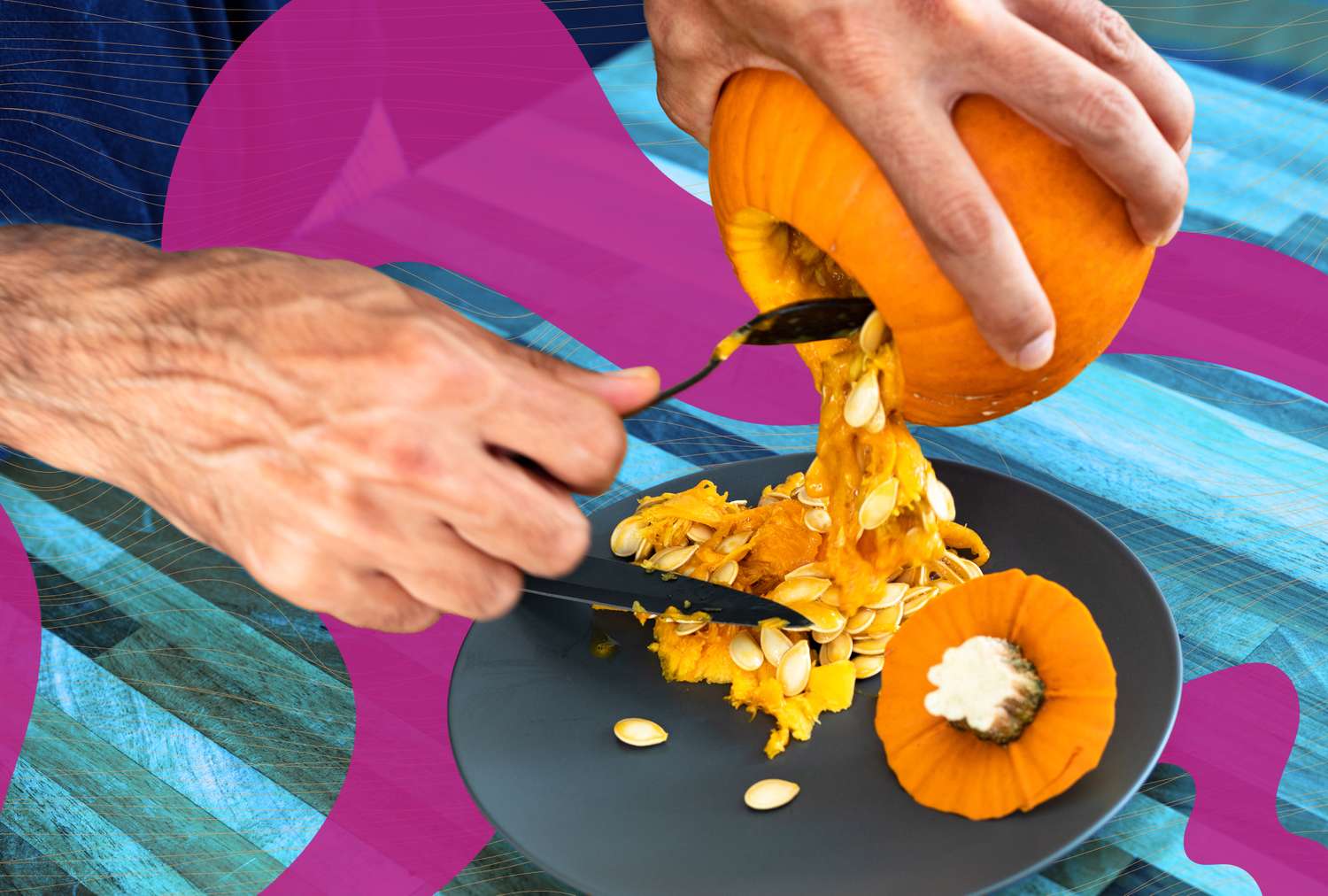Blog
6 Best Fall Foods to Stock Up On to Improve Your Memory

- One in 10 people over 45 say their memory is declining. Fortunately, certain fall foods may help.
- Seasonal foods rich in vitamins, fiber and antioxidants may improve memory and brain health.
- You can get these from pumpkin seeds, Brussels sprouts, cranberries, greens, oats and mushrooms.
If you can’t remember where you put your cellphone or why you just walked into the kitchen, you’re hardly alone. According to the Centers for Disease Control and Prevention, roughly 10% of people over 45 say their memory is getting worse. However, keeping your brain sharp is about more than just doing puzzles or socializing with friends. What you eat also plays a big role in memory and cognition.
The good news is, there are lots of delicious foods that help keep your brain functioning at its best. And many of them just happen to be coming into season in the fall. So, if you’re someone who loves eating in alignment with the seasons and could use some help remembering where those keys are, reach for these dietitian-recommended fall foods. They’re loaded with nutrients to keep your memory quick and sharp, and they’re tasty, too!
1. Pumpkin Seeds
Instead of dumping the seeds when you carve your Halloween pumpkin, roast them for a memory-boosting snack. What makes these little guys so powerful? Pumpkin seeds are packed with fiber (nearly 8 grams per cup!). While we often think of fiber for its digestive-health perks, research has found that fiber may also improve cognitive health via a pathway known as the gut-brain axis. This communication superhighway sends constant signals back and forth between the gut and the brain. So, when gut health thrives, your brain functions more efficiently.
While roasted pumpkin seeds are a delicious, crunchy snack, they’re also a fantastic way to add brain-boosting nutrients to salads, cereal, granola, yogurt parfaits and more.
2. Brussels Sprouts
September marks the beginning of Brussels sprouts season. Besides being the epitome of satisfying cool-weather veggies, Brussels sprouts may help improve your memory. “Brussels sprouts are rich in sulforaphane, a plant compound in cruciferous vegetables that helps to prevent oxidation and promotes brain health,” says Sheri Gaw, RDN, CDCES. One study found that older adults who took a sulforaphane supplement for 12 weeks exhibited faster mental processing and improved mood compared to a control group that received a placebo.
Brussels sprouts are the perfect veggie to add to a simple sheet-pan dinner. But you don’t have to cook them to reap their benefits. When time is tight, shave them into a hearty fall salad.
3. Cranberries
“Cranberries aren’t just a fall favorite (hello, Thanksgiving sauce!),” says Lauren Manaker, M.S., RDN, LD. “They’re also powerhouses for brain health.” These berries’ bright red color comes from pigments with potent antioxidant and anti-inflammatory effects called anthocyanins. “Once in your system, anthocyanins can cross the blood-brain barrier, where they may help protect nerve cells and potentially delay the onset of Alzheimer’s and Parkinson’s diseases,” says Manaker.
For instance, she points to a study in which older adults consumed freeze-dried cranberry powder (equivalent to 1 cup of fresh cranberries) daily for 12 weeks. At the end of the study, they demonstrated significant gains in episodic memory, which is a measure of long-term memory. They also experienced increased blood flow to the brain.
Don’t just save them for cranberry sauce! Add fresh or frozen cranberries to smoothies or salsa. Or, toss dried cranberries into trail mix or energy balls. If their tart flavor is too much for you, try adding them to something sweet, like a cranberry-nut bread or an apple crisp.
4. Leafy Greens
A whole host of dark leafy greens are in season in the fall. So, it’s the perfect time to add more of them to your rotation. “Consuming leafy greens like kale, spinach and collard greens may slow cognitive decline with age, improve memory and support critical thinking skills,” says Melissa Mitri, M.S., RDN. Leafy greens provide nutrients that have been shown to support brain health and cognitive function, such as folate, beta carotene and vitamins E and K., They’re so beneficial for brain health that the MIND diet—an eating pattern designed to prevent cognitive decline and dementia—recommends eating at least one serving of leafy green vegetables each day.
For a quick and easy way to score more of these powerful greens, toss some prewashed kale or arugula into a salad. But if you’d like to take things to the next level, get creative! Blend spinach into a pesto, serve a piece of roasted chicken or fish over sautéed Swiss chard, or stir some collard greens into a hearty fall stew.
5. Oats
As the weather cools down, cozy up with a comforting, warm bowl of oatmeal. “Oats offer memory-boosting benefits, provide sustained energy to the body and mind, and help regulate blood sugar,” says Mitri. “They are a slow-digesting carbohydrate, are rich in fiber that supports brain health, and contain B vitamins and antioxidants that support various cognitive functions,” she adds.
A small, yet encouraging body of research has linked short-term intake of oat extract to better brain function, particularly cognitive processing speed. However, more research on oats themselves (rather than their extract) is necessary to confirm these findings.
In the meantime, don’t just save these nutritious grains for your morning cereal or your favorite overnight oat recipe. Put them to work in breakfast cookies, energy bars or even risotto or congee.
6. Mushrooms
“Regular mushroom intake is linked to improved cognitive performance in the areas of memory, executive function and the ability to recall words,” says Mitri. In fact, eating just one serving of these fungi per week could help boost brain health! One study found that people who ate at least one serving of mushrooms weekly were less likely to forget to do a task in the future—like taking medications or running an errand. While researchers aren’t sure precisely what makes mushrooms so helpful for memory, they suspect their combination of protective antioxidants and anti-inflammatory compounds may be involved.
Mushrooms are the perfect earthy veggie to incorporate in fall dishes. Think chicken Marsala, roasted mushrooms or mushroom risotto. Or, simply toss some pre-sliced mushrooms into salads or soup when you’re short on time.
Other Strategies to Improve Memory
Staying sharp isn’t just about what you eat. To fine-tune your memory, keep these expert-backed tips in mind:
- Stay active. As the weather begins to cool, it can be tempting to hibernate inside. Instead, “Take advantage of the crisp fall weather by going for walks, hiking or raking leaves,” suggests Manaker. “Physical activity improves blood flow to the brain, which may enhance memory and overall mental sharpness.”
- Get your zzz’s. “With shorter days and cooler nights, fall is the perfect time to prioritize sleep,” says Manaker. While you’re asleep, your body gets rid of toxins in your brain. Sleep is also crucial for forming brain pathways related to learning and the creation of new memories. So, aim for at least seven hours of slumber per night.
- Limit alcohol. Studies show that drinking alcohol is linked to a higher risk of dementia. If you’re a regular drinker, try cutting back. Instead, unwind with a fun fall mocktail or cozy up with a warm cup of herbal tea in the evening.
Brain-Healthy Recipes to Try
Our Expert Take
As summer turns to fall, there are loads of brain-healthy foods coming into season. And many of these may play a key role in enhancing memory. If you want to improve your memory, dietitians recommend eating more pumpkin seeds, Brussels sprouts, cranberries, leafy greens, oats and mushrooms this fall. These foods boast a combination of vitamins, antioxidants, fiber and slowly digested complex carbohydrates that have been linked to better brain health, which can help keep you sharp and on your toes. So, ring in the start of cooler weather with a brain boost by adding these seasonal fall foods to comforting stews, snacks, salads and soups.












